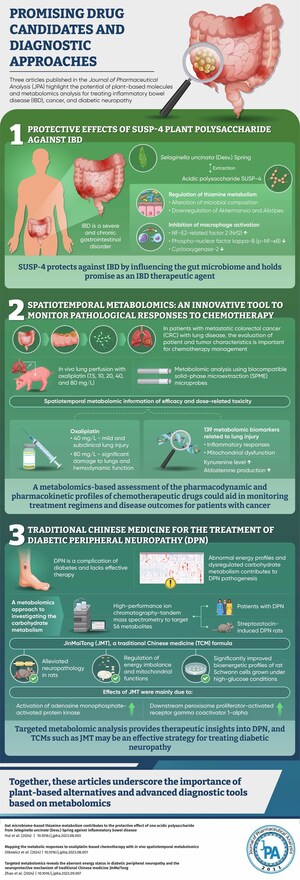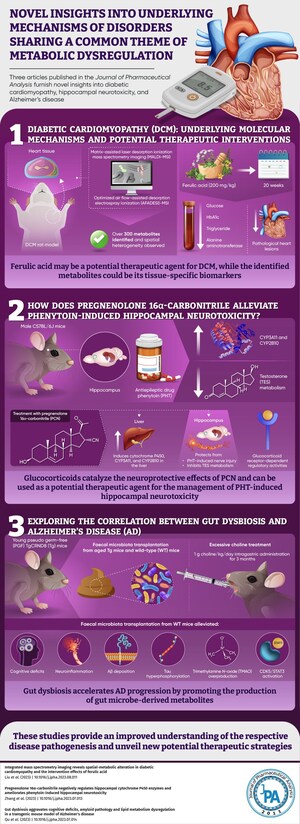Journal of Pharmaceutical Analysis Studies Make Advances in Spatiotemporal Pharmacometabolomics, Plasma Proteome Profiling, and Hepatocellular Carcinoma Therapeutics
XI'AN, China, July 27, 2023 /PRNewswire/ -- In three recent articles published in the Journal of Pharmaceutical Analysis (JPA), researchers utilize novel techniques for unraveling the metabolism and hepatotoxicity of amiodarone in 3D HepG2 spheroids, exploring plasma proteomics and its translational applications, and investigating the anti-hepatocellular carcinoma efficacy and mechanisms of ginsenoside Rk3.
In the first article, which was available online on 14 April 2023 and published in Volume 13 Issue 5 of JPA in May 2023, researchers report the development of a new method for detecting drug-induced hepatotoxicity using 3D HepG2 spheroids and ambient mass spectrometry imaging. Drug-induced hepatotoxicity is routinely assessed during drug screening, which involves the use of two-dimensional (2D) monolayers of hepatocytes. However, 2D monolayer-based experiments do not accurately mimic the physiology and environment of liver cells.
Explaining the advantage of their technique, author Ruiping Zhang remarks, "3D cell spheroid models and mass spectrometry imaging (MSI) allow us to investigate various physiological and pathological processes. We coupled airflow-assisted desorption electrospray ionization-MSI with 3D HepG2 spheroids to assess the metabolism and hepatotoxicity of amiodarone (AMI)."
The mechanisms by which AMI, a widely used antiarrhythmic drug, causes liver injury, remain elusive. The current study used AMI as a model drug and examined its likely metabolic action inside the liver using 3D HepG2 spheroids.
Using this new method, the researchers performed high-coverage imaging of more than 1,100 endogenous metabolites. They treated the 3D HepG2 spheroids with AMI at different time points, obtaining 15 AMI metabolites involved in N-desethylation, hydroxylation, deiodination, and desaturation metabolic reactions. The team eventually identified the dysregulated metabolisms of arachidonic acid and glycerophospholipid, indicative of the AMI hepatotoxicity mechanism, and constructed a biomarker group of eight fatty acids that exhibited improved correlation to cell viability.
"This work exemplifies a new method for the screening and discovery of hepatotoxicity biomarkers and can be used for the early evaluation of drugs," comments Zeper Abliz, one of the corresponding authors.
The second study focuses on simplifying the proteomic characterization of plasma. Researchers show how NaY, a newly synthesized zeolite adsorbs and traps proteins from blood plasma, thus forming a protein corona or layer. Author Jin Zhao observes, "Our study data clearly indicate that NaY can help identify and quantify nearly 4,000 plasma proteins, including those in low abundance, with extreme sensitivity." A pilot study based on the plasma samples obtained from 30 patients with lung adenocarcinoma and 15 healthy subjects shows that the NaY-based technique can accurately differentiate affected patients from healthy subjects via plasma protein detection.
The third study focuses on the potential treatment of hepatocellular carcinoma (HCC), the third leading cause of cancer-related deaths globally. Here, researchers investigated the anti-HCC efficacy and mechanisms of ginsenoside Rk3 found in heat-treated ginseng. Says Daidi Fan, an author of the study, "Our results indicate that Rk3 works by binding to PI3K/AKT, proteins often implicated in various cancers including HCC, and regulates their pathway to inhibit HCC growth." Although clinical validation seems necessary, this finding strongly suggests ginsenoside Rk3 as a novel therapeutic agent for HCC with low toxic side effects.
These studies enrich our knowledge of drugs and diseases!
Reference
Title of original paper: Spatiotemporal pharmacometabolomics based on ambient mass spectrometry imaging to evaluate the metabolism and hepatotoxicity of amiodarone in HepG2 spheroids
Journal: Journal of Pharmaceutical Analysis
DOI: https://doi.org/10.1016/j.jpha.2023.04.007
Media contact:
Mengjie Wang
[email protected]
+86-(0)29-82657423
SOURCE Journal of Pharmaceutical Analysis

WANT YOUR COMPANY'S NEWS FEATURED ON PRNEWSWIRE.COM?
Newsrooms &
Influencers
Digital Media
Outlets
Journalists
Opted In






Share this article